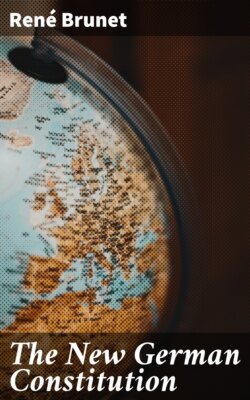Читать книгу The New German Constitution - René Brunet - Страница 10
На сайте Литреса книга снята с продажи.
Оглавлениеc. Elections for the National Assembly are held January 19, 1919.—The victory of the Social Democrats was complete. The Independents, because of the small number of representatives they had elected, refused to form a part of the Central Committee, which thereupon consisted only of Social Democrats and was presided over by Leinert, then by Max Cohen, both very moderate in their opinions. The conflict between the Executive Committee of Workers and Soldiers Councils of Berlin and the Central Committee never gave the government any trouble.
But the Independents and the Spartacists had not at all decided to give up the game, for they believed themselves to be at least “masters of the street.” And Christmas week of 1918 in Berlin was a bloody one. A detachment of marines which had installed itself in the royal castle and had refused to leave it in spite of the orders of the government of Prussia had tried to capture Commissars of the People, Ebert and Landsberg, to keep them as hostages against the non-payment of wages due them. Their attempt failed and troops were summoned by the government to force the sailors to leave the castle. Bloody fights ensued in Berlin which lasted till Christmas.
These events produced a crisis in the government. On December 29 the Independents, Haase, Dittmann, and Barth, resigned from the Council of the Commissars of the People; whereupon the remaining three Commissars immediately handed their resignations to the Central Committee. The latter reappointed the three Social Democrats and completed the Government by adding to them three new Commissars, all Social Democrats, Noske, Wissel, Löbe. Löbe declined and his post remained vacant; but Noske and Wissel entered the Government. Scheidemann replaced Haase as co-president with Ebert.
The Independents and the Communists made another attempt. On January 3, the Independents who had entered the Government of Prussia handed in their resignations. But Eichhorn, since the revolution president of the Berlin police, refused to resign his powers and, being recalled, refused to relinquish his post. That was the signal for a veritable insurrection which had been called, not without reason, “the second revolution.” Troops of Spartacists met in bloody encounters in the streets with the troops of Noske and the affair ended with the assassination of Karl Liebknecht and Rosa Luxemburg.
When, three days later the elections for the National Assembly took place, Germany found itself under an exclusively Social Democratic Government.
